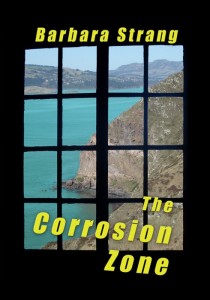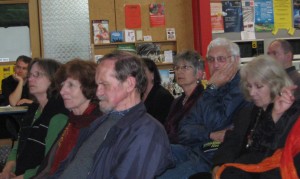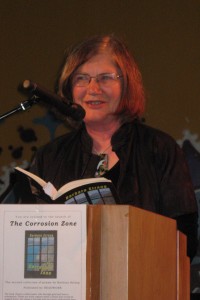A Long Awaited Launch: Barbara Strang’s “The Corrosion Zone”
 On Wednesday 9, the Christchurch poetic community enjoyed a long-awaited launch—in this case for Barbara Strang’s The Corrosion Zone (HeadworX), which was published earlier this year but had its launch deferred by the February 22nd earthquake.
On Wednesday 9, the Christchurch poetic community enjoyed a long-awaited launch—in this case for Barbara Strang’s The Corrosion Zone (HeadworX), which was published earlier this year but had its launch deferred by the February 22nd earthquake.
But the creative and celebratory, as well as other aspects, of Christchurch life are starting to pick up, so it felt good to be going to a launch again. Doubly good in this case, since Barbara asked me to give the launch speech for her book—and being asked by another writer to help launch their work into the world is a great privilege.
There’s been a slight delay, but for today’s post, I thought I’d share what I had to say, together with a few photos of the event.
—
Launching The Corrosion Zone
“As I said on my blog on September 20, when Barbara kindly allowed me to feature Indigo as my Tuesday Poem, I initially approached The Corrosion Zone with mixed hesitation and anticipation. Although the collection is new, I was aware that I had already encountered several of the poems as works-in-progress when we were both part of the Friday poetry group.
So the hesitation was because I feared over-familiarity, the anticipation because I know just how good a poet Barbara is.
As I also said then, all hesitation quickly disappeared as soon as I immersed myself in the collection. For there are indeed some very fine poems within these covers and several sequences, such as the poems about Barbara’s younger brother, Andrew, that were completely new to me.
I think it is no secret that this is a collection where many of the poems deal with very personal subjects: the unraveling of a marriage and then it’s dissolution, including the loss of one home, with all its associations of relationship and family, and relocation into a new environment. There are also poems about loss of family members, with one sequence focused around Barbara’s father, his life and death, and another centered on the suicide of her youngest brother, Andrew.
There is a clear chronological sense to the sections within The Corrosion Zone, effectively charting these events. “On Godley Head” traverses both the sense of unease in Barbara’s marriage and the loss of Andrew. “Hearts” charts the marriage break up; “Postures of Falling” is primarily about its aftermath although the section also incorporates the sequence on Barbara’s father. Finally there’s “Open Home” – but I shall return to that section of the book later.
Marriage break up and suicide, loss of home and loss of family members – these are among the biggest human traumas outside of war and cataclysmic disaster. Although we may not, as individuals, have vigiled on all these emotional shores, most of us will have traversed some—and understand that each one, on its own, is a psychological and emotional “major” for any individual to deal with.
Those of us who are also poets will know the risk that these sorts of experiences give rise to: that of the “diary entry” poem — verse as an emotional outlet and outpouring, therapeutic perhaps, but rarely good poetry. The poet is too close to the material, the hurts too raw for objectivity and clarity.
Perhaps a part of my trepidation on first opening The Corrosion Zone was fear that the collection would founder on poems of this kind. The poet, editor, and critic, John O’Connor, has specifically addressed this risk in his consideration of the book and I would like to share his words with you:
“[The Corrosion Zone primarily] … deals with … two occurrences that had as profound an effect on … [Barbara] … as it is possible to have … [and many] of the poems were written fairly shortly after the events they draw on. It is amazing to me that this was possible. Usually a long time is necessary from traumatic events before sufficient distance can be gained to allow focused writing to take place. … This isn’t a matter of technique – although that necessary distance may be expressed in technical terms – rather it’s a matter of emotional control, of spiritual maturity … “
John’s conclusion is that Barbara has managed to pull this difficult feat off:
“… she has … managed … to turn the facts of heartache and grief into quite luminous poems. They work, they work at times as well as poems can work …”
Those of you who know John O’Connor and the exacting poetic standard he sets, will understand that this is high praise indeed.
I heartily endorse both the praise and the conclusion—Barbara has pulled it off. The collection traverses difficult emotional terrain yet it is never indulgent—but rather spare, wry, and poignant in its understated reserve.
“Yes,” you may say, “but still—surely The Corrosion Zone must, as a collection that focuses on grief and loss, prove attendingly difficult to read?”
To which I reply: Not so. Not in my opinion. Yes there is grief and loss—how not?—but that is by no means all that The Corrosion Zone is. It is not even the greater part of what it is.
So what is it?
.
The collection begins with unease in the poem On Godley Head, where:
“Once we two
forged a path
through untouched forest”
but ends wondering:
“Can we hold hands
and love the wreck
of this land, the skeleton.”
Here we have layers of meaning, an amalgam of poetic subtlety and mystery, while in First Summer, the lines are more direct:
“The opening of
the new century …
… when we hoarded secrets
and bank balances …
… the summer when
I asked questions
and you & I
no longer added up.”
And again, in Breaking Point:
“The easterly hustles in …
ragged clouds flee …
Over the road
concrete trucks rumble
machines claw down trees.”
The un-ease remains, but the reader then experiences the collection’s first transition, into the gentler sequence around Barbara’s brother, Andrew. Loss and grief is there in the lines, as in Reading Andrew’s Poems:
“I read the words this morning
of one whose summer did not come”
and in Back in the garden with cabbage tree flowers:
“Now you’re deep in the soil
at Deborah’s Bay
there is nothing to see
on the port green hill” …
… Unwinding the clock work
finding the escape
wheel – if we could.”
But I think there is something much more here than just grief and loss. These poems are a testament: to Andrew, as in the poem Fatigues:
“Often in Dunedin I notice
a tall young man
who looks like you
But also, I feel, to Barbara. And to relationship: eldest sister; youngest brother. They’re about love:
“If you had asked me
You could have come to stay …
… I’d have rescued you
like an injured bird
kept you in the airing cupboard
till you’d recovered”
And there are many poems with layers, not least Old Pet in the “Postures of Falling” section:
“Molly is not sleek any more
she is middle-aged
and shows it …
… she is past her best
I know it
…
She lies all day in the garden
Her rusty coats blends with the weeds
I hardly notice her.
She and I
in the large backyard –
and only me to miss her.”
Understated, spare, poignant – as much because of what the poem does not say, as what it does.
There are many other observations I can make in praise of The Corrosion Zone, including Barbara’s acute observational eye for detail, particularly of the natural world, which pervades the poem. And the many wonderful lines, like those that conclude the poem Indigo:
” … Indigo
a blue as
deep as your eyes,
the lashes a flight of geese
on the last stripe of blue as the
sky plunges towards night.”
Often though, the key to a collection can be found, not in the opening poems or mid-part lines, but in the closing sequence. In this sense, I feel that the final section “Open Home” unlocks our understanding of The Corrosion Zone.
It is here, I believe, we find the poems that epitomise The Corrosion Zone ‘s theme of transition, as in Between the Acts:
“Putting it behind,
the old house …
… pulling down the blinds
lingering in the
stillness between
the acts”
and Open Home:
“I looked out the windows
and saw for the first time
flickering branches in the sun …
…
I opened the doors
and stepped out,
measured during a long breath
the bird-filled quiet.”
Transition, yes, but also a sense of continuity, as in The Wait:
Over the channel
this morning
you can see them
the godwits on the spit
…
The sand is high this year
the sun needling the fog
as they wait
for a signal,
the days to draw in
the constellations
to configure.”
Transition, continuity — but at the end there is something more again when we take The Mount Pleasant Bus:
“… The sunset plays over us; the details of our lives fall away. Aiming for home, I am being taken on a longer journey.”
Yes, I think: yes. Unease and transition, love and continuity—in the end The Corrosion Zone as a whole is a testament: to being here and being human.
But most of all, I believe, it is a testament to Barbara.”











Sounds amazing, Helen! What a voice!
I really enjoyed reading the collection, Mary.